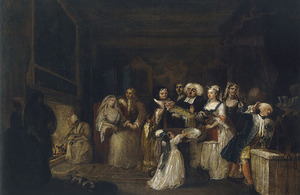Export bar to save satirical Hogarth painting
Culture Minister steps in to prevent 18th century painting from export

Hogarth - The Christening
Culture Minister Matt Hancock has placed a temporary export bar on a satirical painting by William Hogarth to provide an opportunity to keep it in the country.
The Christening by William Hogarth is at risk of being exported from the UK unless a buyer can be found to match the asking price of £1,223,100.
William Hogarth is considered to be one of the most important figures in eighteenth-century British art and culture. He was known for his satirical artwork, and The Christening was his first painted comical scene. It shows a christening taking place in a wealthy but disorderly home. From the little girl about to knock over the christening bowl, to the dog about to rip apart the hat on the ground, the painting is a satirical scene of contemporary life in the eighteenth century.
The painting marks Hogarth’s beginning as a satirical artist and demonstrates his development into comical artwork.
Culture Minister Matt Hancock said:
Hogarth is known as one of our greatest ever satirists and this is a significant early example of his work.
The painting provides a valuable insight into eighteenth century life. Satire is an important part of our cultural heritage and as a fan of Hogarth’s work I hope it can remain in the UK for the public to enjoy.
The decision to defer the export licence follows a recommendation by the Reviewing Committee on the Export of Works of Art and Objects of Cultural Interest (RCEWA), administered by The Arts Council.
The RCEWA made its recommendation on the grounds of its outstanding significance for the study of William Hogarth, as well as for the study of the cultural, literary and historical life of the eighteenth century.
RCEWA member Lowell Libson said:
Hogarth’s importance in imbuing art and artists with a sense of a national character at a time when England was consolidating its international position as the dominant economic and political power cannot be underestimated. This important painting demonstrates Hogarth’s concern with the effects that this new affluence had on all sectors of society. Hogarth himself noted that ‘my picture was my stage’ and The Christening, a small, beautifully executed painting is a deceptively charming and significant early precursor of the great cycles of modern moral paintings and their related engravings. Its retention in this country would considerably add to the story we can tell of a painter who helped define our national identity.
The decision on the export licence application for the painting will be deferred until February 15, 2017. This may be extended until May 15, 2017, if a serious intention to raise funds to purchase it is made at the recommended price of £1,223,100.
Offers from public bodies for less than the recommended price through the private treaty sale arrangements, where appropriate, may also be considered by Matt Hancock. Such purchases frequently offer substantial financial benefit to a public institution wishing to acquire the item.
Organisations or individuals interested in purchasing the painting should contact the RCEWA on 0845 300 6200.
Images of the painting can be downloaded here.
ENDS
For media information contact:
Rebecca Evans
Senior Communications Officer
Department for Culture Media and Sport
Tel: 0207 211 6513
Email: rebecca.evans@culture.gov.uk
Notes to editors
Organisations or individuals interested in purchasing the painting should contact the RCEWA on 0845 300 6200.
Details of the painting are as follows:
William Hogarth (1697-1764)
The Christening
Oil on canvas, 49.5 x 62.8cm
The Reviewing Committee on the Export of Works of Art and Objects of Cultural Interest is an independent body, serviced by The Arts Council, advises the Secretary of State for Culture, Media and Sport on whether a cultural object, intended for export, is of national importance under specified criteria.
The Arts Council champions, develops and invests in artistic and cultural experiences that enrich people’s lives. It supports a range of activities across the arts, museums and libraries – from theatre to digital art, reading to dance, music to literature, and crafts to collections. www.artscouncil.org.uk